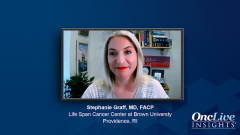
Age-Dependent Results With CDK 4/6 Inhibitors
Experts in breast oncology review age-dependent outcomes with CDK 4/6 inhibitors.
Episodes in this series

Transcript:
Stephanie Graff, MD, FACP: Erika P. Hamilton, MD, [Sarah Cannon Research Institute, Nashville, Tennessee] at ASCO [the American Society of Clinical Oncology Annual Meeting] 2023, presented an update on the patients in monarchE [NCT03155997] that were over the age of 65 and showed that despite their age and comorbidities, slightly higher performance statuses. That correlated then with a higher rate of dose reductions and a higher rate of drug discontinuation, but overall they seem to do as well. They got the same magnitude of benefit.
Of course, the case we’re talking about right now is a premenopausal [patient], so the opposite end of the spectrum, but one of the most interesting pearls from Dr Hamilton’s presentation was a slide showing not just the over-65 population but the whole monarchE study cohort, showed patients that had a dose modification due to adverse events of any age had the same outcome, the same efficacy or benefit of the treatment. I think that is going to be really helpful talking to patients because I know in the curative setting especially, sometimes patients are fearful to lower their dose of medicine if they think it’s going to make it not work as well. Now we can say confidently that it seems that at least in the trial, it seemed like that didn’t hold weight and patients did great with this modification.
Rachel Layman, MD: I agree. I thought that data was really encouraging both that the older patients do benefit, and they can tolerate these medications. I suspect that a younger woman with many years ahead of her is going to be willing to accept more adverse effects in general than an older woman who may just not think that it’s worth it at this point in her life. Although these women over 65 can live many, many years so we definitely want to offer them everything we can to reduce their risk of recurrence. I think that trying to give the highest dose that they can tolerate is appropriate but also dose reduction should be done. I have done this on several occasions in patients both under 65 and over 65 on abemaciclib [Verzenio] and sometimes there was some reluctance to do the dose reduction on the patient’s part, but after they did it, they really felt so much better and felt like they could complete the therapy.
Transcript edited for clarity.






































